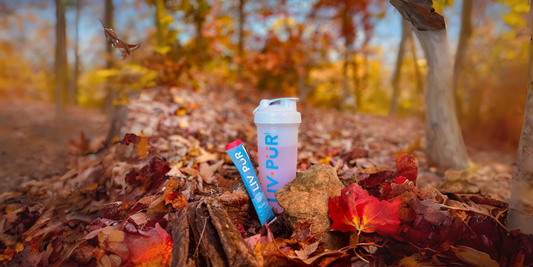There are hundreds of protein powder options on the market that usually either whey-based (milk product from dairy) or plant-based (from soy or pea). To find out which is best for you, it is important to first understand the differences between whey and plant protein powders.
Whey Protein
 Whey Protein is a form of milk protein. Whey, the watery portion of milk, is typically produced as a byproduct of cheese making. Whey goes through various processing steps to become what people generally recognize as whey protein. This powder is typically used for protein shakes, meal replacements and protein bars.
Whey Protein is a form of milk protein. Whey, the watery portion of milk, is typically produced as a byproduct of cheese making. Whey goes through various processing steps to become what people generally recognize as whey protein. This powder is typically used for protein shakes, meal replacements and protein bars.
Types of Whey Protein
- Whey Concentrate- The least expensive and least processed whey protein. Slower absorption rate. Contains 70-80% protein. Contains Lactose (milk sugar) and fat which may cause stomach issues. (Gas and Bloating).
- Whey Protein Isolate- 90% protein. Contains less lactose and fat. Quicker absorption rate and less stomach issues.
- Whey Protein Hydrolysate-(AKA Hydrolyzed Whey). The most processed whey protein and the most expensive due to the amount of processing steps. This protein has been predigested so that it gets absorbed faster than the Concentrate and Isolate. Has the least amount of stomach issues.
Health Benefits of Whey Protein
- Whey protein contains an enormous range of Essential Amino Acids (EAA’s) and Branched Chain Amino Acids (BCAA’s). Research studies reveal that supplementing with whey protein can aid in increasing your strength gains, muscle mass and help lose body fat.
There are a total of 9 Essential Amino Acids which must come from diet or supplementation since the body cant make them. Of these 9 EAA’s, 3 of them are referred to as Branched Chain Amino Acids (BCAA’s), Leucine, Isoleucine and Valine. Leucine has shown to have the biggest impact on your body’s capacity to build muscle protein. Isoleucine and Valine has shown to be effective at producing energy.
- Building Blocks-Whey provides a complete protein which serves as building blocks for increased muscle growth. Strength training coupled with consumption of high protein foods or whey supplements, has been shown to increase strength gains.
- Hormonal stimulant-Whey increases the release of anabolic hormones that can stimulate muscle growth, such as insulin synthesis.
- Quick absorption-Whey is protein is absorbed and utilized very quickly compared to other types of protein.
Plant-Based Protein
 Plant-based protein is a mixture of various plants. Typically, the supplement uses soy, peas, rice, hemp or other seeds to make the protein powder. Many supplements are made using a combination of different plants in order to get a particular protein profile.
Plant-based protein is a mixture of various plants. Typically, the supplement uses soy, peas, rice, hemp or other seeds to make the protein powder. Many supplements are made using a combination of different plants in order to get a particular protein profile.
It is important the the plant-based protein source is of the highest quality.
High-Quality Plant-Based Protein Sources
Brown Rice Protein
On its own, brown rice protein is not a complete protein, meaning it doesn’t contain the 9 essential amino acids your body can’t produce on its own and needs to obtain through food. That means for the most nutritional value, you’d need to combine rice protein with another protein powder as well. It doesn’t stand on its own.
Poorly sourced brown rice protein can also be high in arsenic, which is linked to a number of serious health conditions. However, in one study, researchers found that brown rice protein reduced weight gain more than soy protein. So if you’re looking to lose or maintain your body weight, a high-quality brown rice protein may be worth looking into.
Pea Protein
Pea protein is a complete protein, which means it contains all 9 essential amino acids, including BCAAs leucine, isoleucine and valine that you need to to fuel working muscles and effectively build muscle.
Pea protein also contains 3x more arginine than whey protein. Arginine is a semi-essential amino acid that has many health benefits in the body, including nitric oxide formation. This improves blood circulation. For an active individual, that means quicker recovery, improved endurance and reduced fatigue.
Soy Protein
Like pea protein, soy protein is a complete protein with all 9 essential amino acids (EAAs). While it contains these important EAAs, soy protein also contains phytates that can decrease mineral absorption and phytoestrogens that mimic estrogen in the body and throw off hormonal balance. Soy often also undergoes scrutiny as one of the most commonly genetically modified ingredients along with corn.
Hemp Protein
Overall, hemp protein is a high-quality plant-based protein. It contains all 9 essential amino acids. It’s also easier to digest and less processed than other vegan alternatives like soy. On the other hand, it tends to have an earthy taste that’s undesirable even with additional natural flavors mixed in.
Protein Powder Rich in Essential Amino Acids and Nutrients
 Looking for a protein powder that’s rich in protein is an obvious choice. But we think it’s also important to consider the other nutrients and micronutrients you’re getting from your protein powder — just like you would any other meal.
Looking for a protein powder that’s rich in protein is an obvious choice. But we think it’s also important to consider the other nutrients and micronutrients you’re getting from your protein powder — just like you would any other meal.
For the most nutrient diversity, it’s wise to look for a blended vegan protein powder. For example, at LivPur, we’ve combined classic pea protein with pumpkin seed and mung bean protein for a boost in iron and magnesium.
Free From Artificial Additives
One of the biggest pitfalls of most plant-based protein powders on the market is the artificial additives and fillers companies add to the powder for better taste, texture, and consistency. While they may make the powders more enjoyable, they also lower the quality of your supplement and often make the powder harder to digest. Look for a protein powder with a “clean” label — free from any sneaky ingredients you can’t pronounce.
Manufacturing Standards
What’s the point in checking for quality sourcing if your powder ends up manufactured in a low-quality facility? Here are our standards: Look for a product that’s manufactured here in the United States at a NSF Sport certified and fully accredited FDA cGMP certified facility for the highest-quality manufacturing.
The Best Protein For You
Everyone is different and each body has differing needs. It is important to pick whey or plant-based on your individual goals or dietary preferences. The most important thing to remember when it comes to proteins is to give it time to work. Don't discontinue before allowing the protein or other supplements time to be effective.
LivPur offers both whey and plant-based proteins to help support all your lifestyle and fitness needs.




